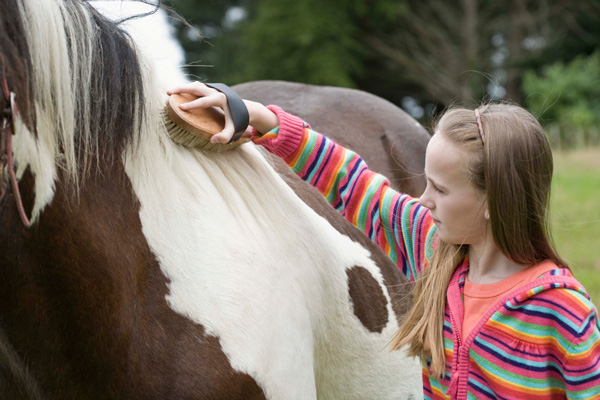
Mature horses that begin to lose weight on an unchanging diet are a puzzle for their owners. It’s not always easy to find the cause of weight loss and correct the problem. An equine nutritionist can suggest changes if the feeding plan needs to be adjusted, while a veterinarian will be the best person to detect a problem with the horse’s health. Sometimes these professionals will work together to solve the dilemma, sorting out various facts that indicate whether the horse is simply not ingesting the proper types or amounts of forage and concentrates, or else is not able to absorb and use nutrients from these feedstuffs.
For the equine nutritionist, the first step is to review what the horse is eating each day. Horses that are turned out on poor-quality pasture are likely to lose weight, especially if they are in any type of exercise program. Even when good pasture and hay are available, a significant increase in exercise level or duration may use more calories than the horse is taking in.
If grain is being fed, a horse in hard exercise may need more of it to maintain body weight. It’s also possible that the feed product doesn’t contain a enough energy for the work the horse is doing. The nutritionist can evaluate the entire feeding program and suggest changes—better hay, more grazing time in good pasture, extra small grain meals, inclusion of energy-dense fat sources—that will help an active horse return to an acceptable body weight.
If plenty of food is available, the nutritionist or veterinarian can ask the owner about the horse’s general health and herd status. Timid or old horses may not have access to pasture-fed hay, while horses that have recently lost a close friend may be too depressed to eat. Equines with dental problems, gastric ulcers, heavy parasite loads, or chronic pain are also likely candidates for weight loss.
Watching the horse eat may reveal more clues to weight loss such as difficulty in grasping, chewing or swallowing hay or grain. When these conditions are resolved by management and care changes, the weight loss problem also should resolve.
If the horse is eating well and is still losing weight, a veterinarian may suspect that the problem involves abnormal digestion and absorption of nutrients or a defect in the way nutrients are delivered to the body tissues. Intestinal disorders; dysfunctions of the liver, pancreas, or kidneys; and toxic conditions such as chronic low-level ingestion of poisonous plants can all result in weight loss. If the cardiovascular or respiratory systems are not working properly, nutrients and oxygen may not be delivered to all parts of the body, and this can result in horses losing weight. This may be the case in horses with end-stage heart failure or severe heaves.
Another reason mature horses begin to lose weight is related to metabolic diseases like polysaccharide storage myopathy or equine motor neuron disease. These conditions can cause a progressive loss of muscle tissue and mass, even when the horse is eating well.
Horses that have some chronic skin disorders or are recovering from severe streptococcal infections may also show some weight loss because they are losing protein and energy faster than they can consume them.
Owners should check horses’ body weight on a regular basis, either with a portable equine scale or a weight tape. The absolute weight is not as important as trends toward weight gain or loss over several months. Weight may vary somewhat by season and exercise program, but any horse that shows unexpected weight loss should be examined to find the cause and fix the problem before it becomes severe.
For more information on equine nutrition or to speak to a nutritionist, visit Kentucky Equine Research.


